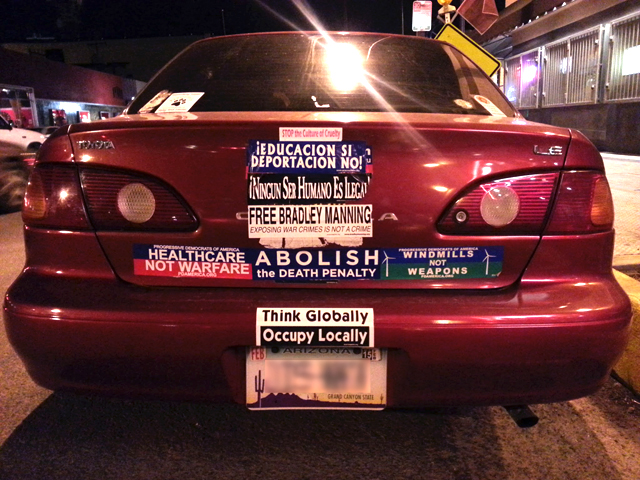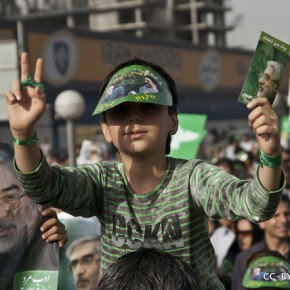Americans spend an inordinate amount of time on the road. In places like the Los Angeles, Houston and the Washington D.C. metropolitan areas, commuters may spend more time studying the cars ahead of them during stop-and-go traffic than they do their own spouses and children upon finally arriving home. That’s why bumper stickers are such an effective means of declaring one’s allegiances.
Given the reputation the United States has for being a gun-happy nation with a simultaneously immature and violent populace, the vehicles with button-pushing right-wing slogans tend to stand out for foreign visitors accustomed to more civil motoring. But anyone who looks hard enough will also encounter a forceful, if sometimes overdone, response to conservative political messages on the part of drivers who refuse to be ashamed of their progressive sentiments.
The car photographed here provides a good example of this approach. Some of the bumper stickers have a broad enough meaning that they will probably not seem obsolete for a long while: “Abolish the Death Penalty”; “Windmills Not Weapons”; and “Stop the Culture of Cruelty.” Others, like “Heathcare Not Warfare,” while not outwardly constrained by specificity, are the product of a more narrowly defined historical context.
The same goes for the two Spanish stickers here, which seek to counter the discrimination against Mexican immigrants that has been running rampant in many parts of the country. Finally, there are the messages that demand to be dated precisely, like “Think Globally, Occupy Locally” that clearly derives from the fall of 2011 or the one that reads “Free Bradley Manning: Exposing War Crimes Is Not a Crime,” which refers to something going on right now, the military trial of the American serviceman who took it upon himself to make damning communiqués by the nation’s leaders available to all via Wiki-Leaks.
What is most intriguing about progressively festooned automobiles like this one is their owners’ apparent unwillingness to pick and choose among causes. By the time the rear end is covered with bumper stickers, it becomes difficult to prioritize. Are immigration issues more important than the critique of warfare? Does a diffuse, long-term goal trump a more focused, short-term one like freeing Bradley Manning? The take-home message seems to be that people on the Left can’t afford to be “single-issue,” whether in their thinking or their organizing. That’s a far cry from the heyday of the class struggle. Then again, the American mind was always better suited to pluralism.
Commentary and photograph courtesy of Charlie Bertsch.





